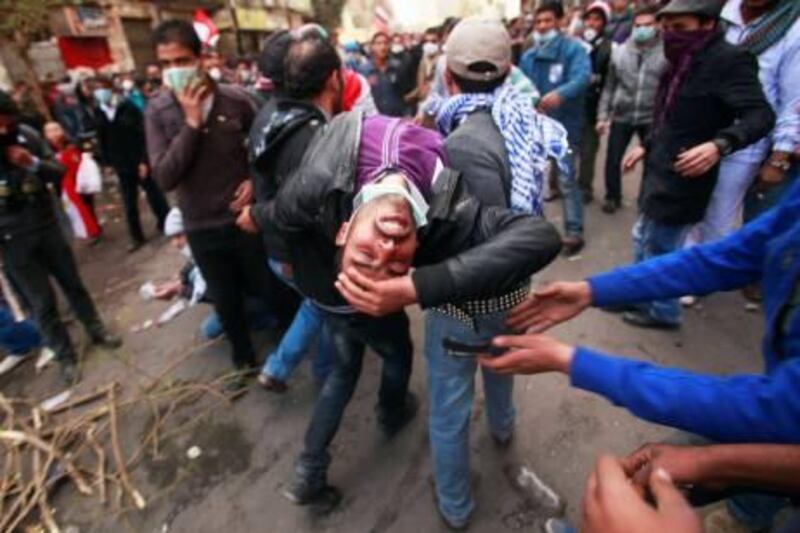CAIRO // At least four people were reported dead and many more injured across Egypt yesterday as thousands of protesters and football fans clashed with security forces in major cities.
The violence erupted on Thursday night and continued throughout yesterday into the evening amid popular fury over a melee at a football match in Port Said that left 74 people dead - the world's worst football-related violence in 15 years. Within hours of the rampage that followed the match between Cairo's Al Ahly and Port Said's Al Masry teams on Wednesday night, political parties, officials and football fans began to blame the interior ministry and the military rulers running the country.
Late last night, the Tax Authority building, opposite the interior ministry was in flames, state television said. Earlier crowds swelled in Cairo and protesters began to hurl rocks at riot police, the police used tear gas canisters to disperse the crowds. There were also reports of bird shot being fired in Suez, where two people died yesterday, according to the health ministry. Two people died in Cairo – including one man who died just steps away from the interior ministry, the Associated Press reported.
People chanted "Down, down with the military regime", as mostly young men ran back and forth near the interior ministry as canisters set off clouds of tear gas. Field hospitals were set up across downtown Cairo to tend to people overcome by the gas, who were ferried away by motorcycles and ambulance.
Police fired round after round of tear gas but the wind picked up yesterday afternoon to waft the fumes back to the police lines, leading the rioting protesters, some of whom waved soccer team flags, to cry "God is Greatest". Some of the demonstrators, mostly men in their late teens and 20s, goaded the security forces defending the neat five-story ministry building, shouting "The army, the police - one filthy hand".
More protesters were expected to gather in the centre of the capital for the "Friday of Anger" declared by 28 youth activist groups and political parties.
Youssef, an 18-year old Al Ahly supporter who was being treated yesterday by a field doctor in Cairo for birdshot splashed on his back and arms, said he had been throwing rocks at the police when he was injured. "What can I do? I am here to get justice for my beloved brothers who died. I will either get it or I'd rather die like them," said Youssef, who would not give his second name because he feared for his life.
Meanwhile the interior ministry urged protesters "to listen to the sound of wisdom ... at these critical moments" and prevent the spread of chaos.
Marches on Thursday in Cairo led to Tahrir Square and then to Mohammed Mahmoud Street, where clashes had left 40 dead in November. Using scrap metal and ropes, the protesters demolished a 4.5-metre wall made of concrete blocks and marched towards the interior ministry.
In an emergency session on Thursday, the newly elected members of the People Assembly - the lower house of parliament - criticised the interior ministry for standing by at the match in Port Said while thousands of people rushed onto the pitch after the match. Victims were trampled in stampedes, suffocated in narrow hallways where exits were blocked and stabbed in what appeared to be in part fan rivalry. They called for the sacking of the interior minister, Mohammed Ibrahim, who was appointed a month ago.
The prime minister, Kamal El Ganzouri, announced he had dissolved the Egyptian football association's board and referred its members for questioning by prosecutors. The governor of Port Said province and the area's police chief resigned.
Magdi Abdelghani, a well-known Egyptian footballer who played for both Al Ahly and Al Masry during the 1980s, described the event as the "worst tragedy" in Egyptian football history and blamed the police.
"The Ministry of Interior has a responsibility to determine the security risks of a match," he said. "They told the football league that they could secure the match. If they weren't able, why didn't they say? Who let in the knives, the fireworks? Who closed the gates? These questions have to be answered."
To others, the disaster was the result of a volatile mix of poor security, simmering rivalries and post-Mubarak unease.
Abdel-Monem Said Aly, the director of the Al Ahram Centre for Political and Strategic Studies, said he "blamed the general atmosphere of chaos" for the tragedy.
"The police didn't do their job," he said. "This is because they have been chased, defamed, and delegitimised since last year. They are in a very difficult position. If they cracked down, they would be blamed. They stood to the side, so they are being blamed. They are damned if they do, damned if they don't."
Suggestions of a conspiracy behind the Port Said tragedy were fuelled further by the pivotal role played by the "ultras" for Al Ahly, as well as Zamalek's football teams, in the protests last year.
One of the biggest battles, known as the Camel Battle, took place on February 2, 2011, in Tahrir Square. Lawsuits filed against several members of Hosni Mubarak's National Democratic Party have alleged that hundreds of "thugs" - including men on camels armed with clubs and knives - were hired by the old regime to attack the protesters in Tahrir Square.
More than 20 people died and hundreds were injured. Many of the staunchest defenders of Tahrir were "ultras", according to activists.
The battle was a turning point in the uprising, unifying opposition to Mubarak that forced his resignation.
bhope@thenational.ae
* With agencies





